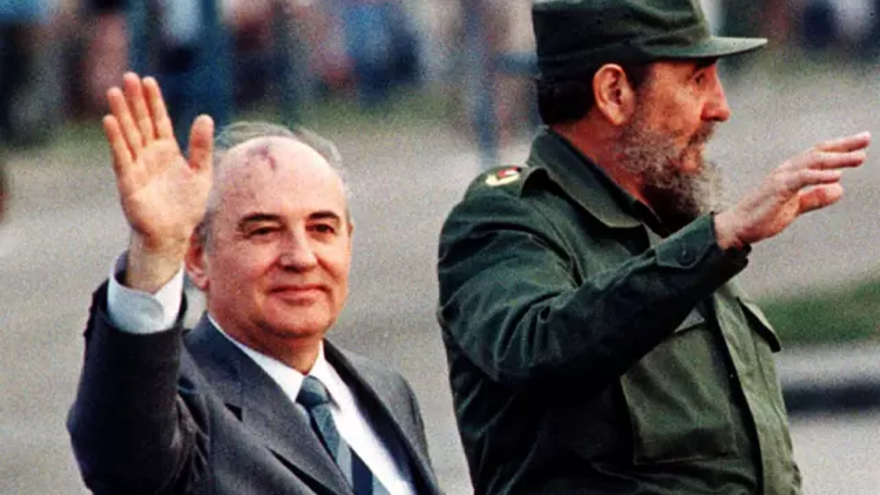
![]() 14ymedio, Frank Calzón, Miami, 3 September 2022 — Mikhail Gorbachev, the Soviet leader who wanted to salvage communism with his reforms and openings known as glasnost and perestroika, could not convince Fidel of the pragmatism of these reforms during his visit to Cuba in 1989. Fidel did not like the interest generated by the Russian — younger than he — among Havanans, nor did he like his ideas of renewal.
14ymedio, Frank Calzón, Miami, 3 September 2022 — Mikhail Gorbachev, the Soviet leader who wanted to salvage communism with his reforms and openings known as glasnost and perestroika, could not convince Fidel of the pragmatism of these reforms during his visit to Cuba in 1989. Fidel did not like the interest generated by the Russian — younger than he — among Havanans, nor did he like his ideas of renewal.
Now, the state-run press in Cuba has limited itself to succinctly informing about his death, which has been the subject of hundreds of articles and commentaries in the most important press outlets around the world.
In an article this week in the Washington Post, Nathan Sharansky, a human rights activist and former political prisoner in the USSR, wrote that Gorbachev, “expressed regret that the U.S.S.R. had fallen apart, but also emphasized his personal achievements, including the promotion of political and religious freedom, the introduction of democracy and a market economy, and, of course, the end of the Cold War.”
In his book titled Perestroika, published in 1987, Gorbachev — who would become the leader of the Soviet Union the following year — wrote that “the world is not what it used to be, and its new problems cannot be solved by the inherited concepts of centuries past.” Gorbechev did not want continuity.
Those ideas and his willingness to cooperate with the United States were anathema to Fidel Castro, who always wanted to be the leader of a grand anti-American coalition. The immediate result was that Havana banned the distribution of Russian publications, such as Sputnik and Novedades de Moscú [News from Moscow], and began to repatriate the Cubans who lived in Russia to avoid contagion with the dangerous reformist virus.
Among those who were later disgraced for favoring the reforms were General Arnaldo Ochoa, a national hero decorated by Fidel Castro himself and later executed on the dictator’s orders following a sham trial for drug trafficking.
Regarding Ochoa’s case, the Los Angeles Times stated at the time that “it is possible that Arnaldo Ochoa will be spared from a firing squad by his old friend and leader Fidel Castro, but . . . Castro has decided that his Island’s future lies in . . . Stalinist Communism including purges and show trials for those unfortunate apparatchiks who stray from the party line.”
After the Soviet Union disappeared, Irina Zorina, an intellectual, and a group of Russian dissidents founded the Russian Committee for Human Rights in Cuba and the Russian Embassy in Geneva responded to a call from Carlos Franqui and Freedom House, sponsoring a session to hear the grievances of former Cuban political prisoners who were visiting the United Nations Commission on Human Rights in the Swiss city.
The session was also attended by diplomats, journalists and representatives of human rights organizations. Cuba’s State newspaper Granma ran an editorial commentary illustrated with rats, vodka bottles and American flags, alleging they wanted to convert the Russian diplomatic mission into a tavern.
Sharansky’s Washington Post article comments that during Gorbachev’s, “first trips to the West. . .Gorbachev discovered that the Soviet Union had paid a heavy diplomatic and economic price for its treatment of dissidents. As a result. . .he began to release political prisoners and long-time refuseniks (Jews fighting for their right to emigrate to Israel.) ”
Shanasky also wrote in his book, The Case for Democracy, that “three things are necessary for people to achieve freedom: people on the inside willing to suffer to achieve it; people on the outside to help them; and for democracies to condition their political, economic, and cultural relationships on the regime’s implementation of specific reforms, beginning with the release of political prisoners.”
Translated by: Silvia Suárez
____________
COLLABORATE WITH OUR WORK: The 14ymedio team is committed to practicing serious journalism that reflects Cuba’s reality in all its depth. Thank you for joining us on this long journey. We invite you to continue supporting us by becoming a member of 14ymedio now. Together we can continue transforming journalism in Cuba.
